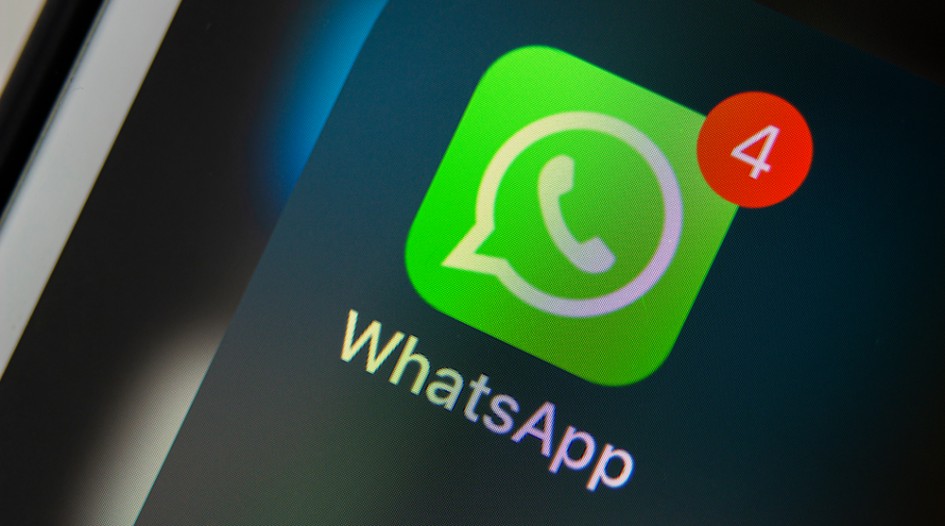Pinheiro Neto advising WhatsApp on payments revival attempt in Brazil

By Emilio Demetriou-Jones From GBRR
WhatsApp is attempting to re-launch its payment platform in Brazil after being suspended within a week of its debut last month, as the central bank’s director says modifying existing regulations was the only way it could permit the service in its original form.
Banco Central do Brasil (BCB) director João Manoel de Mellosaid during a 20 July webinarthat the central bank sees the entry of ‘big tech’ as a huge opportunity for Brazil, as long as they play by the rules.
“Everyone can participate. We will allow it, no problem. People can take whatever path they want and [do] whatever initiatives they want as long as rules and regulations are met,” he affirmed.
WhatsApp launched the service, which was powered by Facebook Pay, on 15 June.
But days later, on 23 June, the regulator suspended the platform. According to a report in Reuters, the BCB says it did not receive a formal launch request – despite WhatsApp claiming it did show the central bank its launch plans beforehand.
Brazil’s central bank also ordered both Visa and Mastercard, who were among WhatsApp’s payment partners in Brazil, to suspend the start of activities and immediately stop using the WhatsApp application to initiate payments and transfers.
The BCB also said that as well as competition and data privacy worries, officials voiced concerns over whether WhatsApp required a licence as a company offering payment services.
WhatsApp avoided the capital reserve and other regulatory requirements of becoming a payment company by contracting both Visa and Mastercard – already licenced by the BCB – to execute money transfers on the platform.
However, BCB president Roberto Campos Neto explained that, because this is the first time a payment service provided by a tech company has existed in Brazil, the central bank was undecided over any licensing implications.
“It’s worth remembering that big tech isn’t in the payments space in a big part of the world, so we’re still in a phase of adjusting our regulations,” he told Reuters.
Brazilian firm Pinheiro Neto has confirmed to GBRR that it is advising both WhatsApp and Mastercard in talks with the BCB to re-launch the platform.
The firm said it helped prepare Mastercard’s merchant and processor rules in relation to the payment network to which WhatsApp was linked, and said it oversaw the “whole process until the Mastercard Rules were approved by the Central Bank”.
But during the webinar De Mello said that suspending the application was still necessary as it formed a completely novel arrangement of a collective of companies and processors. “From a legal point of view, this type of payment solution requires a change in the regulation. These parties need to be authorised by the BCB,” he explained.
He also said the decision to block the application allowed the BCB to investigate possible risks to the functioning of theBrazilian Payment System.
Pinheiro Neto also told GBRR it helped WhatsApp to implement Facebook Pay based on Brazilian regulations.
WhatsApp’s payment service would have been free for individuals, but carried a 4% processing fee for businesses.
De Mello suggested it was unclear to the central bank why WhatsApp was charging this much. “Why does it cost 4%? It is [not a question of implementing] a limit or not, rather it is important we understand the logic of the business strategy and why it charges this amount,” he said.
He added that the BCB sees proposed market initiatives as a positive, even if they are not part of the PIX environment. “We want to foster competition,” he noted.
Despite WhatsApp’s suspension, Rosine Kadamani, co-founder of the Blockchain Academy in Brazil, tells GBRR that the central bank is generally supportive of new and innovative payment methods and this should not put off non-conventional digital payment players.
“It has been quite open generally in the development of new regulations allowing for the entrance of new players, and stimulating more competition. They have also been very proactive in the preparation of a payments system that will allow for instant payment between accounts and payments through QR codes and PIX [instant payments system], which is a clear evidence of their modernisation efforts,” Kadamani says.
The PIX system will be launched by the BCB in November this year, and aims to facilitate instant payments in the country. It will be integrated among banks, payments and financial institutions apps and fintechs, and aims to boost competition in the sector.
Counsel to WhatsApp and Mastercard
- Pinheiro Neto
Partner Bruno Balduccini
For more on this story go to; GLOBAL BANKING REGULATION REVIEW





